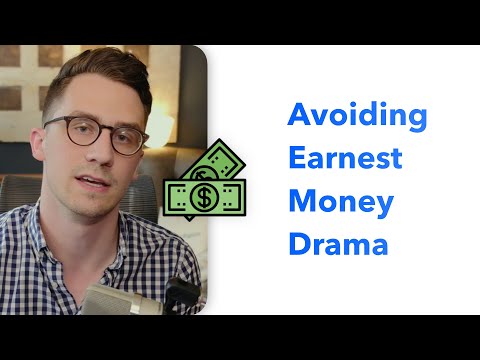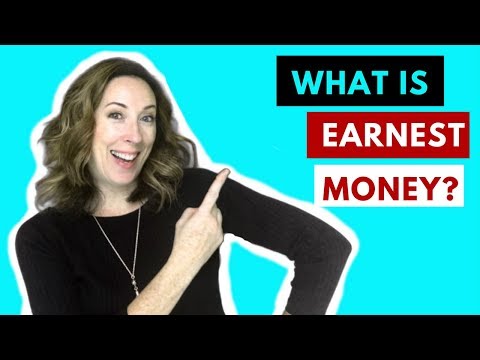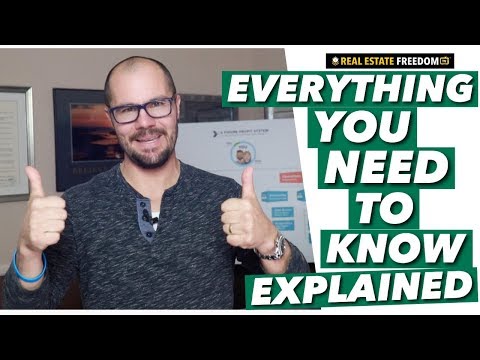When you’re toe-to-toe with the challenge of locking down your dream home, understanding the rules of the game can be the difference between a missed opportunity and a triumphant purchase. Enter earnest money – an integral, yet often misunderstood, piece of the real estate puzzle. Like the careful players in a high-stakes bidding war, let’s navigate through the intricacies of Earnest Money, ensuring you emerge as a seasoned and empowered buyer.

Decoding Earnest Money: The Essential Buyer’s Deposit
What exactly is earnest money? Think of it as a financial promissory note, showcasing your commitment to the home-buying process. In the bustling real estate market, where each move counts, it serves as both a symbol and substance of your determination to seal the deal. Unlike a casual wink or a handshake, Earnest Money is your skin in the game – a good faith deposit that nudges the seller to take their property off the market, as both parties dance towards closing.
Here’s the gist: it’s not like tossing a couple of coins into a wishing well, hoping for the best. Nor is it a replica of other deposits that you may have encountered before. Earnest Money differs in that it’s part of the real estate tango between buyer and seller, setting the stage for a performance that ends with keys in your hand, not just reserving your spot in line.

Earnest Money Amounts: How Much is Enough?
Now, don’t get your wallet in a twist wondering how deep you have to dig for this deposit. On average, Earnest Money chimes in between 1% and 3% of the home purchase price. It’s like a player’s ante in poker; the precise amount can be a calculated move in the strategic game of home buying. Various factors shuffle the deck here—the state of the market, property popularity, and even a seller’s disposition.
Remember, the economic landscape can be as varied as the 209 area code area’s geographical terrain. Whether you’re eyeing a quaint bungalow or a sprawling estate, racing in a seller’s market might call for a heftier earnest deposit, much like adding a few more chips to the pile in that metaphorical poker game.

| Topic | Details |
|---|---|
| Definition | Earnest Money, also known as a good faith deposit, is a sum of money put down to demonstrate a buyer’s seriousness about purchasing a home. |
| Purpose | – Signals buyer’s commitment to the seller – Removes the home from the market temporarily as the transaction proceeds |
| Typical Holding Entity | – Escrow account or trust – Managed by a third-party (e.g., legal firm, real estate broker, title company) |
| Payment Methods | – Personal check – Certified check – Wire transfer |
| Amount | – Varies based on local customs, market conditions, and the home’s price – Often ranges from 1% to 5% of the purchase price |
| Contingencies | The money is refunded to the buyer if certain contract-specified contingencies are met |
| Non-refundable Cases | If the buyer cancels the contract outside of contingency terms, the earnest money is typically forfeited to the seller |
| Competitive Markets | Earnest money may become non-refundable (“go hard”) more quickly, signifying a stronger commitment to purchase |
| Relationship to Down Payment | – Earnest money is not the down payment – It is credited towards the down payment at closing – Down payment is a separate, larger sum due at closing |
| Dispute Resolution | In case of disputes, earnest money is often held by the escrow holder to protect against liability |
| Example | On a $300,000 home, earnest money could be between $3,000 (1%) and $15,000 (5%) |
The Earnest Money Escrow: Safekeeping Your Deposit
Imagine earnest money as a precious gem you’re vying to add to your crown. You wouldn’t entrust it to just anyone, right? Enter the escrow account—a vault, if you will, where this gem is securely stashed away. An escrow account isn’t the star of the show, but it sure has a pivotal role, ensuring that your Earnest Money doesn’t vanish like a mirage in the desert sun.
Managed by a reliable third party, such as a title company or legal firm, this escrow account is where your check, certified slice of your savings, or wire transfer resides until the closing curtain drops. It’s a set-up that’s tighter than compression Socks For men, designed to keep your earnest deposit safe and sound.

Contract Contingencies: The Safety Net for Your Earnest Money
Now, sometimes even the best-laid plans hit a snag. That’s where contract contingencies come into play, acting like a safety net under your high-wire act. Typical contingencies include a successful home inspection, an appraisal that aligns with the asking price, and the assurance that financing will come through like an unexpected plot twist.
To tango out of a deal smoothly, these contingencies are your choreographed escape steps, preventing you from kissing your Earnest Money goodbye. They’re the difference between an “Oh no!” and an “All is well,” preserving your deposit even when the plot thickens with unexpected intrigue.

Earnest Money Risks and Disputes: Navigating Choppy Waters
Not to be a downer, but let’s face it—disputes can pop up like an unexpected plot twist in Sandman Season 2. In these choppy waters, Earnest Money can be caught in the middle, like a prized buoy everyone’s trying to grab. If there’s even a whiff of a dispute, know that the escrow holder might hold onto the money tighter than a drum just to sidestep being dragged into the fray.
Understanding the legal seascape is key here. To circumvent the risk of losing your deposit, or at least to grapple with disputes, knowledge is your best ally. It’s like having a compass in a storm, guiding you safely to your destination.
Earnest Money Refunds: Getting Your Money Back
Under certain conditions, it’s indeed possible to have your Earnest Money swoop back to you, like a boomerang returning to its master. Maybe the sale sank because of one of those contingencies you cleverly included in the contract. If so, taking back your Earnest Money can be as streamlined as a refund process for a pair of ill-fitting shoes, providing you played by the rules.
To ensure the process is smoother than a ride in a luxury sedan, pounce on that paperwork with the precision of a cat and communicate with the involved parties as if your Earnest Money depended on it—because, well, it does.
Earnest Money in Special Cases: Auctions, Foreclosures, and New Constructions
When you venture into the high-octane world of real estate auctions, foreclosures, and new construction sales, earnest money morphs into a more nuanced player. Here, it’s as flexible as bamboo in the wind, very much like dining at an Inchin Bamboo garden. Each scenario serves up its own recipe for Earnest Money involvement, reflective of the risks, rewards, and peculiarities of these distinct real estate flavors.
For instance, auctions may demand steeper earnest deposits to showcase uber-serious intent, similar to how one might eagerly anticipate the Avatar 3 release date. On the other hand, foreclosures and short sales evoke a different earnestness as the bank or lender is the conductor of the symphony.
The Earnest Money Receipt: Documenting Your Deposit
Don’t underestimate the power of the paper trail—your Earnest Money receipt is as vital as the treasure map for Blackbeard’s loot. This unassuming document is a stamped declaration of your commitment, detailing the amount, the date, and where your deposit is spending its temporary exile.
Ensure every T is crossed and every I dotted on this receipt. In the unforgiving realm of property transactions, the well-kept records wield power, forming a breadcrumb trail straight back to your wallet if the need arises.
The Role of Agents and Attorneys with Your Earnest Money
Think of real estate agents and attorneys as your trusty guides through the labyrinth of the home buying odyssey. They don’t just hold the lantern; they map out the pitfalls and rope bridges, steering you clear of potential traps. When dealing with Earnest Money, their sage advice can be the armor you didn’t know you needed.
Whether it’s negotiating the delicate dance of Delinquency or avoiding the sharp edges of Default, the counsel of these seasoned professionals can be like a shield warding off anything thrown your way in the pursuit of homeownership.
Earnest Money Negotiation Strategies for Buyers
Much like a seasoned chess player contemplating their next game-winning move, you too can deploy Earnest Money as a king-making strategy. Up the ante in competitive markets by increasing your earnest deposit, thus polishing your offer until it shines brighter than the Northern Star.
Remember, in the cosmic game of real estate negotiations, Earnest Money can play mind games with the seller, subtly tipping the scales of perception ever so slightly—but significantly—in your favor, just as a tactical pawn inching towards a back-row coronation.
Future-Proofing Earnest Money: Trends and Predictions
The more things change, the more you’ve got to stay on your toes. With real estate evolving as briskly as technology itself, the handling of Earnest Money is no exception. We’re sprinting towards a future where blockchain and smart contracts might dictate the tune to which earnest deposits dance.
Predicting the trajectory, it’s essential to keep your finger on the pulse of market innovations, trends that are shaping up the floor over which the property waltz unfolds.
Conclusion: Your Earnest Money Mastery
So, here we are at the tail end of our Earnest Money odyssey, wiser and equipped to embark on the home buying journey with aplomb. Tuck these insights under your belt, view them as part of your financial arsenal, and you’re sure to navigate the market with the finesse of a maestro.
Remember, understanding Earnest Money isn’t just about protecting your funds; it’s about brandishing your prowess as a buyer. So, grasp tight the reins of your home-buying chariot—yours is not just the power of purchase, but the elegance of an Earnest Money maestro, ready to conquer the real estate realm with confidence.
Get the Skinny on Earnest Money
Ready to dive headfirst into the wild world of homebuying? Hold your horses! Before you start dreaming of paint swatches and picket fences, there’s a little something called earnest money you’ve got to wrap your head around. It’s a pretty big piece of the puzzle and you can bet your bottom dollar it’s important to get the hang of it!
The Skinny: What’s This Earnest Money Business Anyway?
Okay, picture this: You’ve found the one – the house that has you starry-eyed and ready to plant your roots. But how do you show the seller you’re serious as a heart attack about buying the property? That, my friend, is where earnest money enters the stage, strutting its stuff like a peacock.
In layman’s terms, earnest money is like going steady with a house. It’s your way of saying, “Hey, I’m committed to this relationship,” while not yet popping the full question with the Down Payment. Imagine it as a promise ring you give to the seller. It’s not the whole engagement, but it sure means you’re not just kicking tires.
The Nitty-Gritty: Is Your Earnest Money in Jeopardy?
Now, you might be sweating bullets thinking, “What if something goes sideways?” Good question! If the deal goes belly up, whether you get your earnest money back depends on the nitty-gritty of your contract. Think of it like a dance-off – if you step on your partner’s toes and breach the contract, you might lose your earnest deposit. But, if you’ve got moves like Jagger and everything goes according to plan, that earnest money often goes towards your down payment or closing costs. Smooth moves, indeed!
Quirky Quirks of Earnest Money and Its Buddies
Here’s a brain teaser for you: What’s the difference between earnest money and a down payment, apart from their knack for burning a hole in your pocket? Remember, your earnest money is just a slice of the pie – a teaser, if you will – while the down payment is the whole shebang. It’s like earnest money is the appetizer and “Down Payment” is the main course at the homebuying feast.
Put simply, the earnest money shows you’ve got skin in the game. It’s not as hefty as the down payment, but don’t be fooled – it’s still a chunk of change you’ll want to protect. So, you might be chucking your hard-earned dough into the wishes well, but with fingers crossed, you’ll see it again come closing day!
Wrapping Your Noggin Around the Numbers
You’re probably scratching your head, wondering how much dough to throw down as earnest money. Well, it’s not rocket science, but it’s also not chump change. Typically, you’re looking at 1% to 2% of the purchase price. A more competitive market might see you ponying up a little extra to show you’re the big dog. But remember, it’s not about showing off, it’s about making a fair shake to lock in your dream home.
Now, don’t go emptying the piggy bank just yet. Before you commit, do a little homework, chat with your real estate guru, and make sure you’re not biting off more than you can chew. After all, you don’t want to put so much on the line that you’re up a creek without a paddle if things head south.
So, there you have it: a crash course in earnest money. It’s a pretty big cog in the homebuying wheel but understanding this bad boy can make you a savvy shopper and get you one step closer to nabbing the keys to your castle. Just remember, keep your eyes on the prize and your earnest money smart, and you’ll be sitting pretty on your very own front porch before you know it!

Who keeps earnest money if deal falls through?
Who keeps earnest money if deal falls through?
Well, who gets the earnest money when things go south hinges on the contract’s contingencies. If the buyer backs out on a whim, the seller usually pockets the earnest money. But if a legit hiccup according to the agreement pops up, the buyer might get their cash back. It’s all about the fine print!
What typically happens to earnest money?
What typically happens to earnest money?
So, what’s the deal with earnest money, you ask? Typically, it goes into an escrow account and sits tight until the deal wraps up, then it’s applied to the buyer’s down payment or closing costs. If the deal tanks for a covered reason, back to the buyer it goes. Otherwise, it can be a nice little bonus for the seller.
Who gives earnest money back?
Who gives earnest money back?
Hang on! If the deal hits the skids for a reason that’s covered in the agreement, it’s the escrow company that usually returns the earnest money to the buyer. They’re the neutral third party holding onto those funds, after all.
Is earnest money the same as a down payment?
Is earnest money the same as a down payment?
Nope, they’re not twins! Earnest money is like a deposit showing you’re serious about buying the house. It’s usually a smaller chunk of change. The down payment, though, is the hefty amount you pony up to make the mortgage company happy when you close the deal.
How common is it to lose earnest money?
How common is it to lose earnest money?
Freaking out about losing your earnest money? Don’t sweat it too much. Losing the dough isn’t super common. As long as you play by the rules and keep an eye on those contract conditions, your earnest money usually isn’t on the chopping block.
Do you get earnest money back if loan is denied?
Do you get earnest money back if loan is denied?
Absolutely, if your loan hits a dead end and you’ve got a financing contingency in your contract, you should see your earnest money skipping back to your wallet. It’s one of those safety nets for buyers, so make sure it’s in the agreement!
How does earnest money get refunded?
How does earnest money get refunded?
If you’re due a refund, the escrow company’s the one writing the check. They’re holding it, to begin with, so they’ll go through the motions to make sure you get your money back as long as the contract says you should.
Can earnest money be lost?
Can earnest money be lost?
Sure can, if you go off-script! If you toss the contract contingencies out the window or you’re a no-show at closing, wave goodbye to your earnest money. It’s all about sticking to the game plan.
What is a normal amount of earnest money?
What is a normal amount of earnest money?
Typically, you’re talking about 1% to 2% of the purchase price. For a $300,000 house, that’s like $3,000 to $6,000. But hey, it’s not set in stone—market conditions or how eager you are can tweak those numbers.
What happens to earnest money if buyer cancels?
What happens to earnest money if buyer cancels?
If the buyer bails for a reason that’s in the contract—maybe a bad inspection or a mortgage flop—they usually get the money back. But if they just get cold feet, the seller might end up doing a happy dance all the way to the bank with that earnest money.
What happens to earnest money after the closing is completed?
What happens to earnest money after the closing is completed?
After closing, the earnest money usually gets tossed into the mix for the down payment or closing costs. It’s like getting credited at the end of the game—it goes back into the buyer’s pocket, but in a roundabout way through the house purchase.
What is the purpose of earnest money deposit?
What is the purpose of earnest money deposit?
Earnest money’s the buyer’s way of saying “Hey, I’m not messing around here!” It’s good-faith money that tells the seller you’re committed. And it gives the seller a bit of security to take the house off the market while the deal goes through the motions.
Does an earnest money check get cashed?
Does an earnest money check get cashed?
Yup, that check isn’t just for show and tell—the escrow company cashes it and stashes it away in their account. It shows you’re serious and ready to rock and roll with the purchase.
How do you calculate earnest money?
How do you calculate earnest money?
Calculating earnest money isn’t rocket science—it’s usually around 1% to 2% of the home’s purchase price. But remember, it’s not a magic number. Your real estate agent can help you sweeten the pot if it’s a hot market or if you’re toe-to-toe with other buyers.
What is an example of earnest money?
What is an example of earnest money?
Picture this: you find your dream pad for $250,000. You might slap down $2,500 to $5,000 as earnest money to lock it down. It’s like putting your money where your mouth is, showing the seller you’re dead serious about the buy.
What will most likely happen to the earnest money if the seller breaches the contract?
What will most likely happen to the earnest money if the seller breaches the contract?
Oh boy, if the seller pulls a fast one and breaches the contract, the buyer often gets their earnest money back. Plus, they might have a case to go after more cash depending on the damage done. It’s a bit of buyer’s insurance, you could say.
Why would you lose earnest money?
Why would you lose earnest money?
Basically, you lose your earnest money if you flake out and don’t hold up your end of the deal. If you bail without a contract-approved reason or miss deadlines, expect to kiss that money goodbye.
What reasons can a seller keep earnest money?
What reasons can a seller keep earnest money?
A seller’s got a few aces up their sleeve to keep that earnest money—it usually involves the buyer breaking contract terms. If a buyer backs out for no reason listed in the contract or lets deadlines fly by, the seller might get to pocket that change.
What is the earnest money for breach of contract?
What is the earnest money for breach of contract?
Earnest money for breach of contract is like a consolation prize for the party left in the lurch. If the buyer bails without cause, the seller might get to keep the cash. On the flip side, if the seller’s the troublemaker, the buyer might get the refund plus a chance to go after more.



